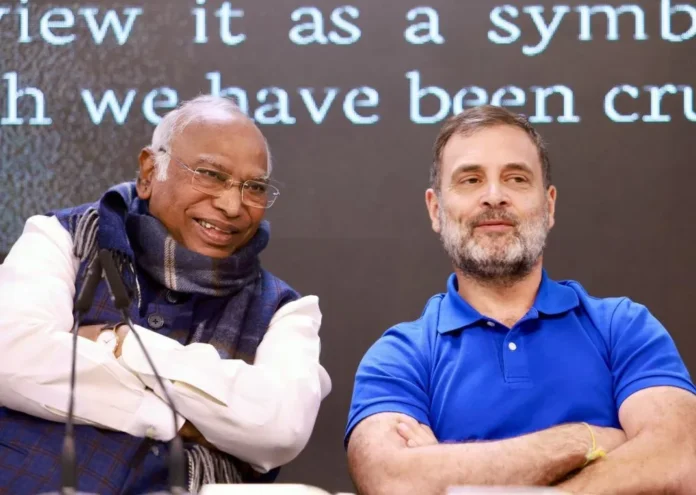NEW DELHI, Dec 24: The Congress party issued a dissent note on Tuesday, following the appointment of former Supreme Court judge Justice V. Ramasubramanian as the new chairperson of the National Human Rights Commission (NHRC) by President Droupadi Murmu. The Congress leaders, Rahul Gandhi and Mallikarjun Kharge, expressed concerns about the selection process, calling it fundamentally flawed, predetermined, and raising doubts about its impartiality and fairness.
The dissent note, dated December 18, was jointly issued by Rahul Gandhi, the Leader of Opposition in the Lok Sabha, and Mallikarjun Kharge, the Leader of Opposition in the Rajya Sabha. Both leaders made it clear that their dissent was recorded “without prejudice to the names of the Chairperson and members approved by the Selection Committee.”
The note outlined four key points of criticism regarding the selection process.
The first point raised by the Congress leaders highlighted what they described as a fundamentally flawed selection process. They alleged that the process was a “pre-determined exercise” that overlooked the established tradition of mutual consultation and consensus, which they argue is vital in such decisions. According to the note, this departure from tradition undermines the fairness and impartiality that are essential to the credibility of the Selection Committee. Instead of fostering deliberation, the Committee reportedly relied on its numerical majority to finalize the appointments, ignoring concerns and perspectives raised during the meeting.
The second point in the dissent emphasized the importance of inclusivity and diversity in the NHRC’s leadership. Congress argued that the NHRC, as a crucial body tasked with protecting citizens’ human rights—especially those from marginalized communities—should have leadership that reflects the diversity of Indian society. The note mentioned that a diverse leadership would ensure that the NHRC remains sensitive to the unique challenges faced by various communities, particularly those most vulnerable to human rights violations.
The Congress leaders proposed the names of Justice Rohinton Fali Nariman and Justice Kuttiyil Mathew Joseph for the position of NHRC Chairperson. They highlighted the merit and inclusivity considerations behind these choices. Justice Nariman, from the minority Parsi community, is praised for his intellectual depth and commitment to constitutional values, and his appointment would underscore the NHRC’s dedication to India’s pluralistic society. Similarly, Justice Joseph, a former Supreme Court judge from the Christian minority community, was recognized for his judgments promoting individual freedoms and protecting marginalized groups.
For the position of NHRC members, Gandhi and Kharge recommended Justice S. Muralidhar and Justice Akil Abdulhamid Qureshi. Both judges are respected for their exemplary track records in advancing social justice and upholding human rights. Justice Muralidhar is particularly known for his landmark rulings on custodial violence and civil liberties, while Justice Qureshi, from the Muslim minority community, is acknowledged for his strong defense of constitutional principles and accountability in governance.
The third point in the dissent note stressed the importance of maintaining a balance in the NHRC’s leadership that reflects the regional, caste, community, and religious diversity of India. Congress leaders argued that such balance is necessary for the NHRC to operate with an inclusive perspective, sensitive to the experiences of all sections of society. They warned that neglecting this balance could erode public trust in the institution
The final point in the dissent criticized the “dismissive approach” adopted by the majority of the Selection Committee towards these considerations. Gandhi and Kharge regretted that the Committee had disregarded the principles of diversity and inclusiveness that should define the NHRC’s credibility and effectiveness. They stressed that the names they had proposed reflected the spirit of inclusivity and aligned with the Commission’s foundational principles
In conclusion, the dissent note raised concerns about the impartiality and fairness of the selection process, questioning the exclusion of the Congress-recommended candidates. The two leaders emphasized that such exclusions raised significant doubts about the credibility of the NHRC’s leadership selection.

